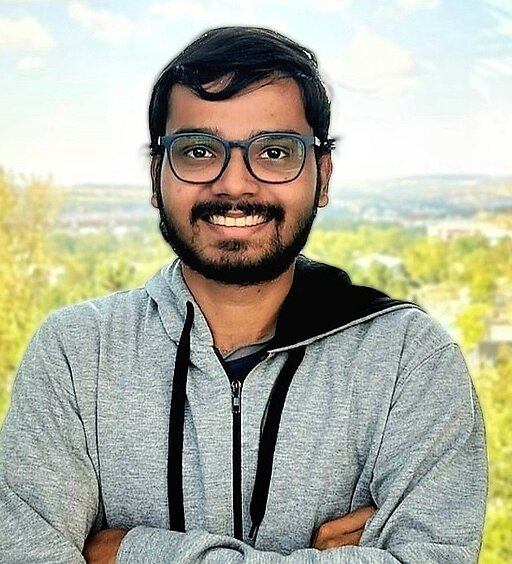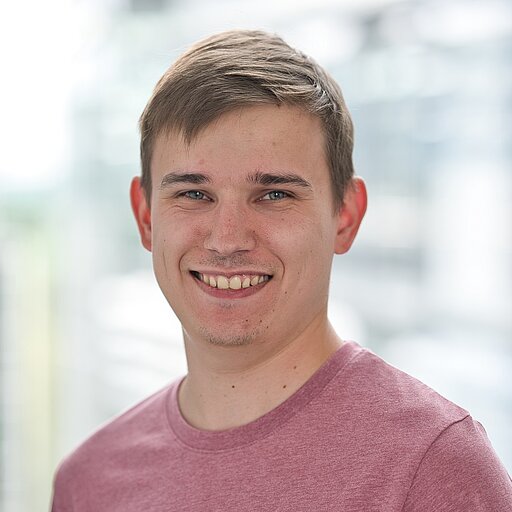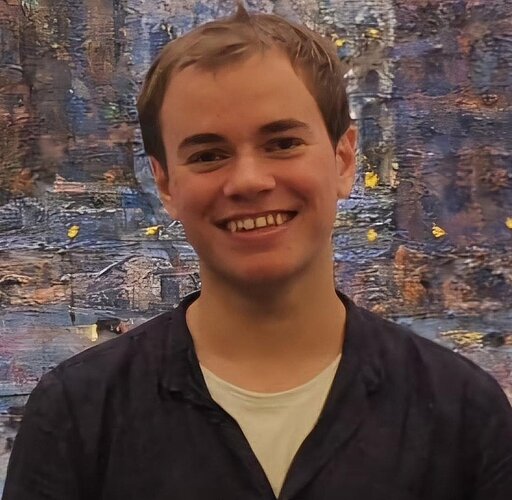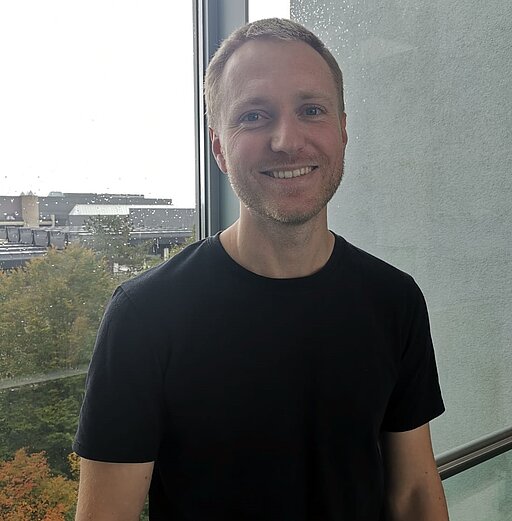Group members

Prof. Dr. Claudia Höbartner

Arpan Banerjee
Arpan is from West Bengal, India, and he obtained his BS-MS degree (Major in Chemistry) in July 2024 from the Indian Association for the Cultivation of Science, Kolkata, India. His BS-MS thesis, completed at The Morpholino Group, focused on synthetic optimization and backbone modifications of morpholino antisense oligonucleotides. In August 2024, he joined the Höbartner Lab for his PhD, where he shifted his focus to designing cell-stable ribozymes using chemically modified nucleic acids. If he is not in the synthesis lab, you'll likely find him creating some weird graphics in front of his laptop or listening to music.

Dr. Irene Bessi
Irene studied Chemistry at the University of Florence (Italy), where she graduated in 2010. She then moved to Germany and pursued her PhD at the Goethe University Frankfurt under the supervision of Harald Schwalbe. She received her PhD in 2016 with a thesis on NMR of G-quadruplex structures. After a first postdoctoral period in the same group, she joined the group of Claudia Höbartner as postdoctoral fellow. Her research focuses on the application of NMR spectroscopy to study structure and interactions of nucleic acids, including fluorogenic aptamers, ribozymes and synthetically modified duplexes.

Hsuan-Ai Chen
Coming from the scenic east Taiwan, Hsuan-Ai started her journey in science from the double bachelor’s degree in chemistry and life science in National Cheng Kung University and moved across the globe to pursue a master education in biochemistry at the University of Würzburg, Germany. With the interdisciplinary nourishment from chemistry and biology, she developed interest in nucleic acid research with a focus on structural interrogation of ribozymes and deoxyribozymes. After finishing her master thesis in the Höbartner lab, she continues her adventure in X-ray crystallography of functional nucleic acids. She wishes to have a green thumb to grow not only diffractive crystals in the lab but also diverse plants in her small garden.

Sarah Christopher
Sarah is from Tamil Nadu, India and she received her MSc degree in Chemistry in 2023 from the Indian Institute of Science Education and Research Thiruvananthapuram, Kerala, India. She completed her Masters thesis under Dr. Reji Varghese, working on supramolecular assemblies. She then joined the Höbartner group for her PhD in September of 2023. She works now on the discovery of new ribozymes to detect epitranscriptomic modifications in RNA. She is interested in the detection of RNA modifications for the diagnosis of various related diseases. Outside the lab, she spends her time cooking spicy food, reading classic novels and attending concerts.

Dr. Julia Dietzsch
Julia studied Chemistry at the University of Göttingen where she joined the Höbartner lab during her master’s studies in 2017 and started to work on fluorogenic nucleic acid systems. During that time, she developed an interest in the synthetic and biochemical work with colorful compounds. She therefore decided to move with the lab to Würzburg to continue with her PhD thesis in which she focused on nucleic acid mediated assembly of merocyanine dyes and fluorescence activation of small chromophores by aptamers. Since 2022 she pursues her research as a postdoc working on different kinds of emitting biopolymer systems. If she is not in front of her hood or the solid phase synthesizer, you will most likely find her running around Würzburg, in the bouldering gym or on her racing bike.

Evgeniia Dorinova
Evgeniia studied Organic Chemistry at the Lomonosov Institute of Fine Chemical Technologies, Moscow and received her bachelor’s degree in 2018. During her master’s studies, she worked at the Engelhard Institute of Molecular Biology, RAS, Moscow where she was involved in the development of an environmentally friendly method for synthesis of biologically important nucleosides based on enzymatic transglycosylation. In 2020, she graduated from the Lomonosov Institute of Fine Chemical Technologies, Moscow with a 1st class honor degree in Organic and Medicinal Chemistry. By the end of her master’s studies, she had developed a deep interest in biochemistry of nucleic acids and was highly motivated to pursue her PhD studies in the related field. In 2021, Evgeniia was awarded a Bayhost Fellowship which financially supports her as a PhD student in the Höbartner group. Her current research project focuses on in vitro selection of novel modified ribozymes. Outside the lab, Evgeniia is into learning German and enjoys running, music and knitting/crocheting.

Dr. Doris Feineis
Nikolas Farn
After joining the group first in late 2019 for his bachelor thesis, Nikolas immediately revealed his passion for nucleic acid chemistry. He deepened his synthetic and biochemical skills further during his master internship and master thesis in 2021. Since 2022, Nikolas is a PhD student. In his research, Nikolas combines conventional organic synthesis with biochemical and enzymatic approaches with a particular focus on in vitro evolution of catalytic nucleic acids with novel functions. Following the motto “science first”, Nikolas enjoys going to the gym at the evening as well as travelling and going out at the weekend.

Maria Greve
Maria was born in the Sauerland. After 18 years in the middle of nowhere she decided to study chemistry in Würzburg, which she completed with a bachelor’s and master’s degree. She first came into contact with the field of nucleic acids during an internship in August 2021. In this internship she synthesized and characterized new ligands for the Chili aptamer. In April 2023 she rejoined the group for her master thesis, in which she studied the relationship between the structure of different Chili-ligand systems and their fluorescence properties. In February 2024 she started her PhD project with a focus on the characterisation and mechanistic investigation of functional RNA systems using NMR spectroscopy. In her spare time, she crochets and knits. Additionally, the entire working group benefits from her baking skills.

Saumya Gupta
Saumya is from Varanasi, India. He completed his Bachelor’s degree in Chemistry at Banaras Hindu University, and then pursued his Master’s at IISER Thiruvananthapuram, where he carried out his thesis under Prof. Kana M. Sureshan on thermal-induced topochemical reactions in the solid state. Motivated by a strong interest in nucleic acid chemistry, he joined the Höbartner Lab in September 2025. His current project focuses on in vitro selection to discover novel ribozymes that preserve the dynamics of modified RNAs. Outside the lab, Saumya loves exploring nature through hikes, staying active with different sports, and unwinding with a good movie.


Konstantin Isenberg
Konstantin Isenberg, born in Regensburg, moved to Würzburg, where he received his B.Sc. and M.Sc. in Chemistry from the University of Würzburg. There, he specialized in cell lipids and fluorescent markers. Building on his interest in biomolecular labeling, he joined the Höbartner Lab to explore nucleic acid research. His work focuses on the development of novel fluorescent nucleoside analogues for enzymatic incorporation, opening up new opportunities in nucleic acid research. Outside of the lab, Konstantin is a volunteer for the Weisser Ring e.V., an avid reader of Perry Rhodan, and enjoys staying active through various sports.

Tina Jungnickel
Tina studied chemistry at the University of Würzburg and first came into contact with nucleic acid chemistry during her bachelor´s thesis in the Höbartner lab. Here, she synthesized modified RNA to study its interactions with proteins. Ever since her interest for nucleic acids only grew as she rejoined the group for her master´s thesis where she worked on the in vitro selection of ribozymes which can catalyze RNA alkylation. In Oktober 2023 she started her PhD to continue her work on catalytic RNAs. Outside the lab you may find her reading fantasy books in the sun or cuddling every cat that is not fast enough to run away.

Nora Marie Knickmeier
Nora obtained her bachelor's degree in chemistry with a focus on theoretical chemistry at the Julius-Maximilians Universität Würzburg. Her journey led her to the Höbartner Lab, where she embarked on her master's degree and continues to pursue her Ph.D. Driven by a fervent curiosity, Nora explores the intricate functions of catalytic RNA molecules. Those molecules might be involved in the origin of life and her special interest is to find a new ribozyme with polymerase activity. She brings a unique perspective to her research, where she aims at merging the worlds of organic synthesis with theoretical chemistry and experimental biochemistry in her pursuit of understanding ribozymes.

Ann-Kathrin Lenz
Ann-Kathrin was trained as a laboratory technician in chemistry and biochemistry at the University of Würzburg and has since been working at the Institute of Organic Chemistry. After a brief stay in the Würthner group she joined the Höbartner lab in 2018. Since then she has a supporting role in almost every project in the biochemistry labs, especially regarding cloning of in vitro selection libraries and the expression of proteins. Beyond that she is often contacted for many technical-organizational worries and needs in the working group. Outside of the lab she enjoys spending her time on the tennis court.

Manuela Michel

Dr. Hermann Neitz
Hermann received his B.Sc. in Biochemistry and his M.Sc. in Chemistry from the University of Göttingen. There he specialized in chemical biology with a focus on peptide chemistry. To learn more about the fascinating world of nucleic acids, he moved to Würzburg for his PhD and joined the Höbartner lab. His research focuses on the development of novel systems with hydrophobic recognition motifs, leading to new opportunities in nucleic acid research. He is currently continuing his research as a postdoctoral fellow to create innovative bioconjugates. Outside of the lab, he still challenges himself with everything from improving his runtimes to playing all kinds of computer games.

Dr. Takumi Okuda
Takumi studied pharmaceutical chemistry at Osaka University, Japan, where he developed his interest in nucleic acid chemistry. During his master's studies, he specialized in the synthesis of artificial nucleic acids, receiving his MSc from the Graduate School of Pharmaceutical Sciences in 2017. Continuing at the same institution, he pursued his doctoral research on designing chemically modified nucleic acids for therapeutic applications and obtained his PhD in 2020. In June 2020, he joined the Höbartner lab as a postdoctoral researcher, where he became fascinated by catalytic RNAs. Currently, his research focuses on developing novel ribozymes essential for RNA modifications in the prebiotic world. Outside the lab, he enjoys staying active at the bouldering gym.
Since July 2025 Takumi has been a junior group leader in Nucleic Acid Chemistry initiating his independet research career.
►Find out more about the Okuda Group | Nucleic Acid Chemistry

Anjan Pal
Anjan is from a small town called Domkal in West Bengal, India. He has done his graduation in Chemistry from RKMVCC Rahara, Kolkata and has obtained his Master’s degree from Indian Institute of Technology Bombay in May 2025. His MSc thesis, carried out in the RA Lab, focused on understanding the structural allostery and activity mechanism of the phenol-sensing protein MorR using biophysical methods and Cryo-EM. Prior to this, he gained research experience in synthetic chemistry at JNCASR, Bangalore, working on triazolyl-based small molecules as potential therapeutics for Alzheimer's disease. In September 2025, he joined Höbartner's lab for his PhD, where his research focuses on catalytic nucleic acid chemistry. He now works on the discovery of new ribozymes to carry out modifications in RNA. Outside the lab, Anjan loves to travel and capture moments through his lens. He enjoys playing badminton and watching different movies and series in the free time.

Dominik Rappert
Dominik studied Chemistry at the University of Würzburg where he graduated with a bachelor's degree in 2021. He stayed in Würzburg to pursue his master studies in Chemistry during which he first got to know the field of biological and nucleic acid chemistry. After a semester abroad at the San Diego State University (USA) he joined the Höbartner lab for his master's thesis, working on modified RNA oligonucleotides. After graduation he continued working in the Höbartner group as a PhD student. His research interests lay in the field of RNA Therapeutics, and he is a part of the graduate program RNAmed.

Luisa Reiser
Luisa was born in Augsburg and moved to Ulm for her bachelor studies, where she did her bachelor thesis in the group of Max von Delius working on C60-fullerene based charge-shuttling rotaxanes. During her studies she developed a particular interest in medicinal and biological chemistry, leading her to move back to Bavaria to pursue her master’s degree in the beautiful city of Würzburg, with focus on organic and medicinal chemistry. She had her first interaction with the Höbartner group during a master internship and came back one year later for her master thesis, where she worked on in vitro selection of fluorogenic aptamers. After a research internship in Sweden, during which she investigated the stabilization of G-quadruplexes in oncogenes by ligation of small molecules, she rejoined the group for her PhD to further work on fluorogenic aptamers and functional nucleic acids. During her free time, Luisa likes to go running and working out and enjoys anything that has to do with music.

Dr. Carolin Scheitl
Carolin studied Chemistry and Biology at the University of Würzburg to become a teacher, during which time she developed her interest in organic and bioorganic chemistry. After completing her first state exam in 2017, she decided to pursue a carrier in the laboratory instead of continuing her work as a high school teacher. During her subsequent master’s studies she made her first contact with the Höbartner lab and the world of functional nucleic acids. With her work on catalytic RNAs, she received her MSc in Chemistry in 2019. As part of her following PhD studies in the Höbartner group, she developed and characterized the first methyltransferase ribozyme (MTR1). Since 2023, she has continued her research as a postdoc in the same lab focusing on expanding the toolbox of functional nucleic acids for the targeted modification of DNA and RNA. Outside the lab, she can often be found in the gym where she is preparing for upcoming wheel gymnastics competitions.

Dr. Florian Seitz
Florian studied chemistry at the University of Göttingen, from where he obtained his Bachelor’s and Master’s degrees. He joined the Höbartner lab for his Master’s thesis and moved along with the group to the University of Würzburg. For his PhD thesis, Florian was researching on the topics of enzymatic recognition and antiviral properties of modified nucleosides. After a 2-year foray into the industrial field of oligonucleotide therapeutics he re-joined the Höbartner group as a postdoctoral researcher, attempting to advance the synthetic and analytical techniques in the field of functional nucleic acid biochemistry. Outside the lab, Florian can be frequently found in the bouldering gym or on obstacle race courses.

Dr. Eva Schöller
Eva obtained her Bachelor`s degree in Biochemistry in Würzburg and completed her studies with her master`s degree in Molecular and Cellular Biology at the University of Erlangen. Her interest in RNA biology and RNA modification was sparked during her PhD in Gunter Meister`s group at the University of Regensburg. During her work, she investigated the mitochondrial tRNA modification m3C and its associated protein METTL8. She continues her RNA biology research as a postdoctoral researcher in the Höbartner lab, expressing and applying functional nucleic acids in both bacterial and eukaryotic cells.

Dr. Martin Volek
Martin is a graduate of Molecular and Cell Biology, Genetics and Virology at the Department of Genetics and Microbiology, Charles University. His Ph.D. thesis was on Development and use of color and fluorescence producing deoxyribozymes under the supervision of Edward Curtis, Ph.D. in the Laboratory of Functional Potential of Nucleic Acids at the Institute of Organic Chemistry and Biochemistry of the CAS. From October 2025, his research in the Höbartner group is funded by a prestigious postdoctoral fellowship from the Alexander von Humboldt Foundation.

Dr. Manisha B. Walunj
Manisha has pursued her masters in Organic Chemistry from Savitribai Phule Pune University, India. In 2020, she completed her PhD degree in Chemical Biology from the Indian Institute of Science and Education (IISER) Pune, India, where she also volunteered at the COVID-19 testing center. Her doctoral research in Srivatsan Lab involved developing metal-mediated reactions for the labeling of nucleic acids. Currently, she is a postdoctoral researcher in the Höbartner group. Her current research interest is ‘synthesis of modified cofactors analogues and in vitro selection of ribozyme for site specific RNA labelling’. Outside of her research work, Manisha enjoys reading philosophy books and sketching, which helps her relax and unwind after a busy day in the lab.



